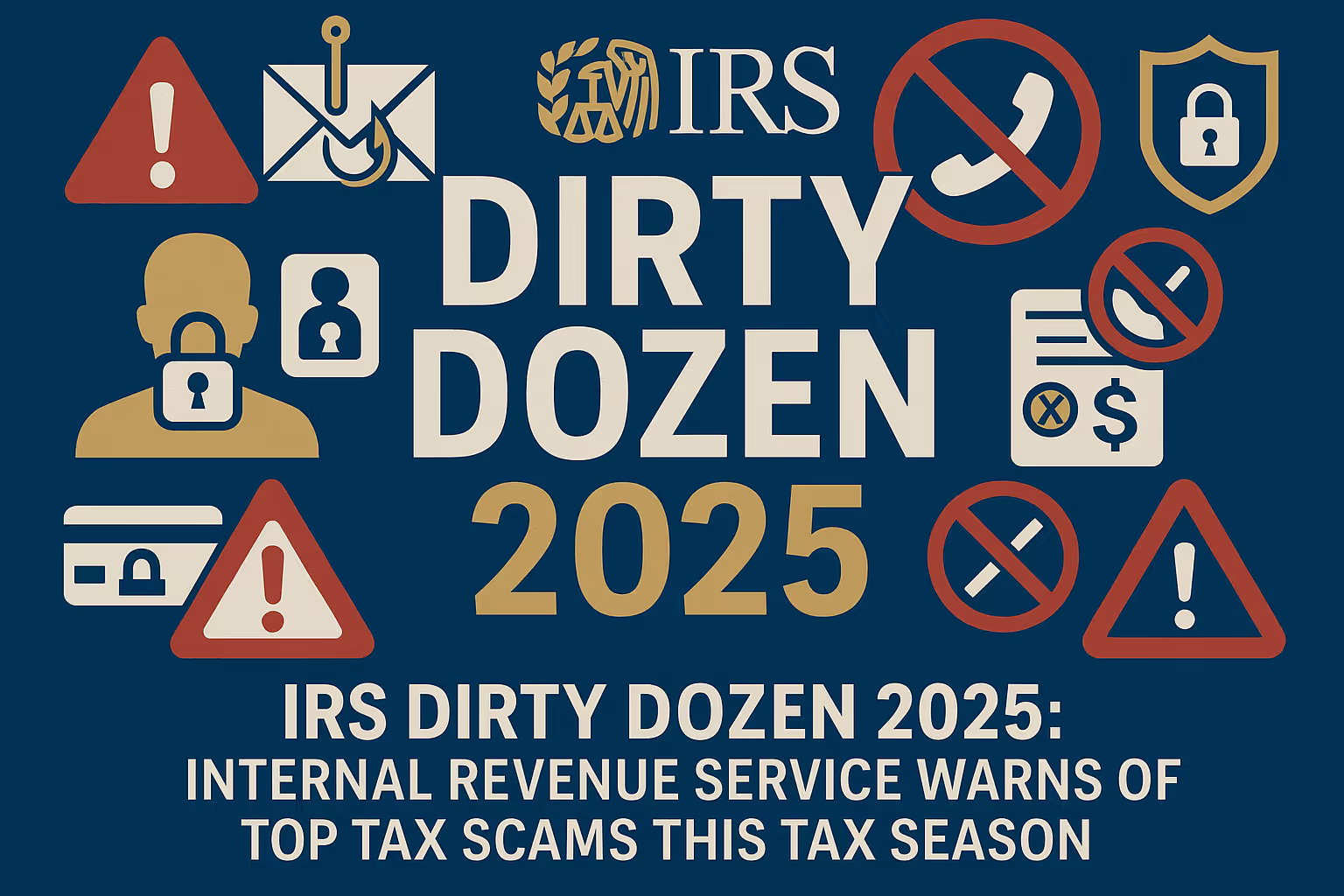
The Internal Revenue Service has released its annual IRS Dirty Dozen 2025 list, warning taxpayers about scams that threaten refunds and personal or financial information. Officials say fraud is escalating during tax season, with spear phishing emails, fake charities, and misleading social media posts spreading bad tax advice among the top risks.
The Dirty Dozen campaign, first launched in 2002, is an awareness initiative to protect taxpayers and tax professionals from evolving schemes. It is not an enforcement action but a yearly list of scams that can lead to tax fraud, identity theft, and fraudulent tax returns.
The IRS Dirty Dozen 2025 notes that scammers often prey on unsuspecting taxpayers during tax season, though many threats persist year-round. By releasing the list early, the Internal Revenue Service aims to highlight warning signs and encourage vigilance.
Criminals impersonate IRS employees through unsolicited emails or text messages, requesting personal information or demanding immediate payment. Victims are often told they owe a bill and must pay by wire transfer or prepaid debit card, with scammers even threatening arrest.
The IRS warns against relying on social media posts for tax advice. False claims have encouraged taxpayers to misuse credits such as the fuel tax credit, employee retention credit, or family leave credits. Filing based on misleading social media tax advice can result in fraudulent tax returns, penalties, and delayed refunds.
Fraudsters launch fake charities after disasters, using misspelled web links or imitation website links that resemble .gov pages. These groups pressure taxpayers to donate quickly, sometimes suggesting contributions will lead to a bigger refund.
The IRS cautions against preparers who promise a big payday, charge fee-based rates, or refuse to sign a tax return. Tax professionals also face client scams and new client scams, where attackers pose as potential clients and send spear phishing attachments to steal financial information.
Many scams on the dirty dozen list result in tax-related identity theft. Criminals use stolen Social Security numbers and financial information to file fraudulent tax returns before the legitimate taxpayer submits one. Victims may later discover that someone else claimed their refund or receive mail linked to tax forms they never filed.
Recovering from identity theft is time-consuming, often requiring an identity theft affidavit and amended tax return. The IRS stresses that spotting warning signs early—such as requests for personal or financial information via unsolicited emails—can prevent major losses.
The campaign is part of the IRS’s broader security strategy, supported by the Security Summit, a partnership with state agencies and the private tax industry. These collaborations have blocked billions of dollars in fraud. In 2024, the Coalition Against Scam and Scheme Threats (CASST) was formed to counter scams fueled by misleading social media posts.
“Scammers are relentless, and they use the guise of tax season to trick unsuspecting taxpayers into a variety of traps,” said Terry Lemons, senior adviser at the Internal Revenue Service who created the Dirty Dozen campaign.
An IRS spokesperson added, “Any request for personal information, immediate payment, or threats of arrest should be treated as a warning sign of fraud.”
Falling for a scam can delay tax refunds, trigger audits, or complicate future filings tied to fraudulent tax returns. Tax-related identity theft can also put financial information at long-term risk.
The IRS reminds taxpayers that it will never initiate contact through text messages, unsolicited emails, or social media about a tax return, refund, or payment. Official correspondence is usually sent by mail, and website links should be verified directly at IRS.gov.
To stay protected, taxpayers should use multi-factor authentication, avoid sharing a Social Security number through unverified channels, and be cautious of promises that seem too good to be true. Red flags include misspelled web links, bigger refund guarantees, or demands for immediate payment.
Tax professionals are urged to remain alert to new client scams, spear phishing attempts, and other social engineering tactics.
The IRS cautions that scammers may file fake returns, misuse personal data, or demand money through threats. Verifying details directly through IRS.gov remains the safest way to avoid scams, protect refunds, and ensure taxes are filed securely.
By William Mc Lee, Editor-in-Chief & Tax Expert—Get Tax Relief Now